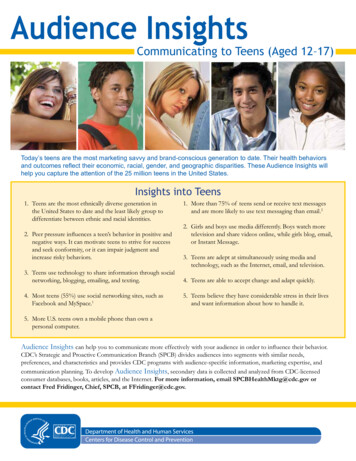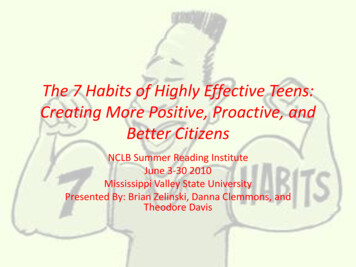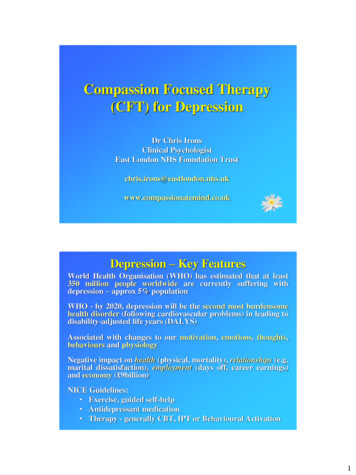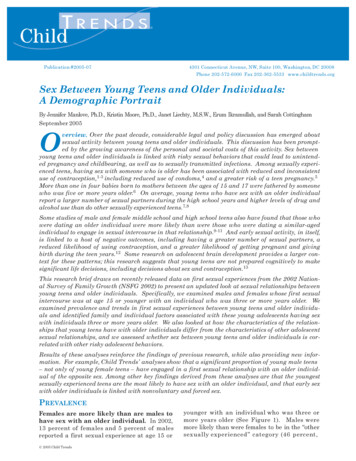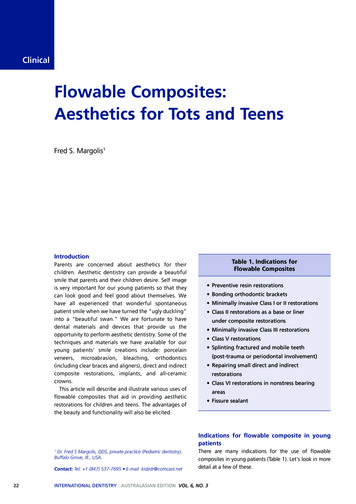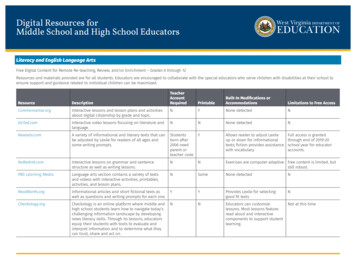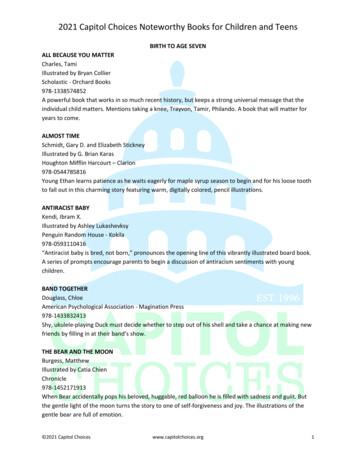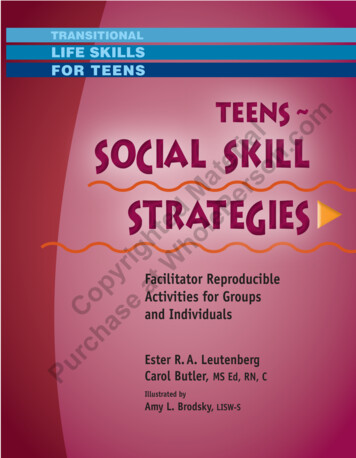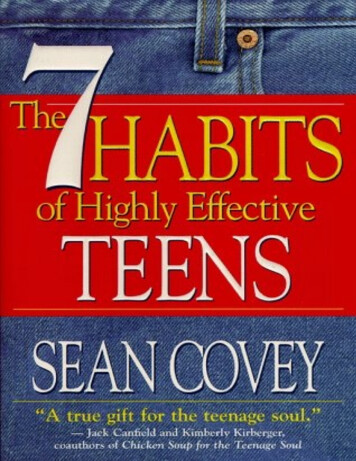
Transcription
What teens and othersare saying aboutThe7 HABITSof Highly EffectiveTEENS“Sean Covey’s The 7 Habits of Highly Effective Teens is a true gift for the‘teenage soul.’ No matter what issues you may be struggling with in life, thisbook offers hope, vision, and the strength to overcome your challenges.”—JACK CANFIELD and KIMBERLY KIRBERGER, coauthors ofChicken Soup for the Teenage Soul“This is an easy-to-understand book full of interesting stories. I really relatedto Sean’s personal story about the fear of performing in front of people since Iam a violinist. I’m sure teenagers around the globe will be able to relate as well.”—EMILY INOUYE, age 14“Sean Covey speaks to teenagers in a way that is both entertaining andthought-provoking. His message offers teens a solid road map to a successfulfuture. I highly recommend it.”—JOHN GRAY, author of Men Are from Mars, Women Are from Venus“The 7 Habits of Highly Effective Teens gives you new insight into themeaning of being powerfully successful. It teaches the importance of settinggoals and sticking to them in order to achieve your dreams.”—PICABO STREET, member of the U.S. ski team and Olympic goldmedalist“What? Sean Covey wrote a book? You’ve got to be kidding!!”—Sean’s high school English teacher“Sean provides an appropriate adaptation of lifelong values and principles thatwhen embraced by teens will enrich their lives earlier and longer—very cool!!”
—MICK SHANNON, President and CEO, Children’s Miracle Network“The 7 Habits of Highly Effective Teens by Sean Covey is a touchdown! Thesooner you develop good, strong habits, the more effective your life will be. Thisbook will help you do just that.”—STEVE YOUNG, quarterback, San Francisco 49ers, and NFL MostValuable Player“The 7 Habits of Highly Effective Teens is a real-life guide to help teens betheir best. Setting goals and writing them down is one of the most importantthings you can do. Commit them to memory, stay focused, and develop thestamina to go the distance. If you do, you can achieve any goal you set.”—TARA LIPINSKI, U.S. figure skating champion and 1998 Olympic goldmedalist“My son was 21 when we discovered The 7 Habits of Highly Effective Peopleand used it to build a new relationship, which continues today—seven yearslater. If only we could roll back the clock to when he was 15, this new bookwould have saved us six years of miscommunication, frowns, and frustration.Dads, this book is your opportunity as well as your children’s!”—CLYDE FESSLER, Vice President, Business Development, HarleyDavidson Motor Company“I used one of the stories from your book in a speech I gave at leadershipcamp and it helped me to be elected governor! Thanks Sean Covey!!!”—LEISY OSWALD, age 16“Sean Covey is following in his father’s footsteps in an imaginative way as heshares his teen experience in a Covey style—The 7 Habits of Highly EffectiveTeens. Lessons learned from his own experience make this a unique guidebookfor a younger generation looking for direction.”—FRANCES HESSELBEIN, President and CEO, the Drucker Foundation,and former President, Girl Scouts of America“The best way to ‘make it happen’ in your life is to make the right choices as ateen. The 7 Habits of Highly Effective Teens lets teens see themselves as theprincipal force in their lives, regardless of their background or current walk oflife.”—STEDMAN GRAHAM, author of You Can Make It Happen and founder
of Athletes Against Drugs“Our youth today are facing ills their parents and grandparents neverimagined. They are searching for answers, and The 7 Habits of Highly EffectiveTeens provides the tools to enable them to find those answers within themselves.With the help of loving parents, teachers, and friends, may our teens be blessedto grow to be happy, healthy, contributing adults.”—DR. ROBERT SCHULLER, author of If You Can Dream It, You Can DoIt; Reverend of the Crystal Cathedral and Hour of Power“Sean Covey’s book should be read by every grandparent and be on everygrandparent’s gift list for the teenagers in their extended family. His principlescan span the generational communication gaps that are too prevalent in today’ssociety. Moreover, his guidelines can turn the hearts of each generation to theothers. Grandparents will make a huge difference in the lives of theirgrandchildren if they will support Covey’s advice for helping teenagers identifytheir own ‘principle centers’ for their developing lives.”—KIRK L. STROMBERG, Director, Strategic Planning and Development,American Association of Retired Persons (AARP)“Sean’s ‘can-do’ examples remind me of how important it is to make the mostof what I have. I play a lot of sports, though I’m not a big kid. This book helpedme realize that I have to rely on my speed and my smarts if I want to reach mygoals.”—BRENT KUIK, age 15“If you want to win in the ‘game of life,’ scoring is essential. The 7 Habits ofHighly Effective Teens gives teens a great game plan for achieving their dreams.Covey offers great insights to help parents coach their kids to reach their highestgoals and overcome any obstacles they might encounter.”—RICK PITINO, coach of the Boston Celtics and author of Success Is aChoice“How we live our lives is based on the values we believe in. This book willhelp any teen, in a very practical way, build a life’s foundation on values thatcount.”—DONALD G. SODERQUIST, Vice Chairman and COO, Wal-MartStores
“With all of the social ills in our society, what this world needs is moreteenagers who have a bright vision of the future, a willing spirit, and thedetermination to contribute to their families, their schools, and the community.Sean Covey’s book teaches our youth how to do just that!”—BOB GOODWIN, President and CEO, Points of Light Foundation“Powerful but not parental—an important message delivering much more thangood advice, it offers true direction to teens living in a challenging, complexworld. Covey offers sound, time-tested direction without sounding preachy orparental packaging unquestionable wisdom into a friendly, approachable bookthat will inspire trust and encourage teens to follow their hearts, rather thansimply follow the group.”—PATRICK S. O’BRIEN, author; founder and President, Making CollegeCount“If The 7 Habits of Highly Effective Teens doesn’t help you, then you musthave a perfect life already.”—JORDAN MCLAUGHLIN, age 17“We all have dreams in life we want to achieve and we can reach these dreamsif we’re willing to always give 100 percent. This book is an intensive trainingprogram for youth to grow and develop so they can become winners in thecompetition of life.”—KRISTI YAMAGUCHI, U.S. Olympic figure skating gold medalist“This book has many positive, inspirational, and motivational strategies tohelp teenagers live up to their potential.”—LAURA C. SCHLESSINGER, Ph.D., author of Ten Stupid ThingsWomen Do to Mess Up Their Lives“The 7 Habits of Highly Effective Teens is a winner! In my years of coachingyoung people, we learned together that working hard, setting goals, and having aclear vision of your dream enables you to be successful, even when you lose.”—LOU HOLTZ, former head football coach at Notre Dame, the 1988national champions, and sports analyst of CBS’s College Football Today“The 7 Habits of Highly Effective Teens is a breakthrough book for teenagers.It enables them to realize how they can achieve their own personal victoriesthrough setting the goals that will lead them to the fulfillment of their dreams.”
—HENRY MARSH, author of The Breakthrough Factor and four-timeOlympian“The 7 Habits of Highly Effective Teens teaches teenagers basic principles tobuild a solid foundation that will sustain them through life’s most difficultchallenges. Most teens need this book. Most important of all, believe in God andHis willingness to help you—all you have to do is ask. It’s called prayer.”—THE REVEREND THEODORE M. HESBURGH, C.S.C., PresidentEmeritus, University of Notre Dame“I have been juggling family, school activities, friends, and after-schoolresponsibilities. When I read The 7 Habits of Highly Effective Teens it helped mebecome a more organized person. I used a lot of the cartoons to help meremember stories and examples.”—JOY DENEWELLIS, age 18“Stephen Covey must be rightfully proud of his son Sean, who absorbed hisfather’s lessons well. Those who wish to avoid the temptations and devastationof drugs, including alcohol, would be wise to implement The 7 Habits of HighlyEffective Teens. Written for teenagers by a recent teen himself, this book is anindispensable tool for helping young people make the right choices whilegrowing up in the chaos of the nineties. I wish there had been a book like this forthose of us who grew up in the sixties!”—CANDACE LIGHTNER, founder, MADD (Mothers Against DrunkDriving)“Motivation is only a part of the game of life. Self-discipline and self-controlare key in making your dreams reality. This book offers all the tools you need asa teen to be a champion in life.”—MIA HAMM, member of the U.S. women’s national soccer team andFemale Athlete of the Year“Whether to sink in self-pity or swim in the ocean of knowledge is a choicewe are called upon to make in life. Here is an excellent guide for youth, by ayouth, to make life meaningful.”—ARUN GANDHI, grandson of Mahatma Gandhi and founder of theGandhi Institute“The 7 Habits of Highly Effective Teens challenges teens to break through the
boundary of being ‘average’ to become their personal best. All teens can achievetheir goals and dreams if they have the courage to do what it takes to reach them—this book shows in clear examples how they can do this.”— DAVE CHECKETTS, President and CEO, Madison Square Garden“The 7 Habits of Highly Effective Teens is gold. In my coaching life before theOlympics, I loved working with youth and learning with them and from themabout the importance of having dreams, setting goals to achieve them, andcelebrating the victories. Sean Covey’s book reinforces just that message!”—DICK SCHULTZ, Executive Director, U.S. Olympic Committee“The inspiring examples from real-life problems that teenagers like myselfdeal with every day, and their experiences and situations, have helped me makelifesaving decisions. I highly recommend this book to any teenager.”—JEREMY SOMMER, age 19“The teens in our world ‘deserve this break today’! Sean Covey’s The 7Habits of Highly Effective Teens teaches youth everywhere to be industrious,have integrity, and give back to family and community. This book reinforces thatour teens can be the hope for a better world.”—MICHAEL QUINLAN, CEO and Chairman, McDonald’s Corporation“This book really caught me by surprise! I’ve not put it down, and nearlycompleted it five hours after receiving it. What a refreshing thing to see a writertell things as they are, without preaching and with real-life values.”—DOUGLAS SPOTTED EAGLE, international recording artist andlecturer“For a professional athlete, winning basketball games is important —butwinning at the game of life is even more important. The 7 Habits of HighlyEffective Teens provides a game plan for teens to become team players with theirteammates in life, their families and friends. It presents strategies for becoming abetter all-around person and elevating individual skills.”—SHERYL SWOOPES, women’s professional basketball player“Today’s teens are the future leaders of our families, communities, and nation.The 7 Habits of Highly Effective Teens teaches them the value of hard work,setting and achieving goals, and taking responsibility and initiative, all of whichare characteristics of effective leaders.”
—MICHAEL O. LEAVITT, Governor of Utah and Vice-Chairman,National Governor’s Association
Other Books from Franklin Covey Co.The 7 Habits of Highly Effective PeoplePrinciple-Centered LeadershipFirst Things FirstDaily Reflections for Highly Effective PeopleFirst Things First Every DayThe Breakthrough FactorTo Do Doing Done: A Creative Approach to ManagingProjects and Effectively Finishing What Matters MostThe Power PrincipleThe 10 Natural Laws of Successful Time and Life ManagementThe Nature of LeadershipThe 7 Habits JournalThe 7 Habits Family JournalQuotes and QuipsThe 7 Habits of Highly Effective Families
FIRESIDERockefeller Center1230 Avenue of the AmericasNew York, NY 10020www.SimonandSchuster.comCopyright 1998 by Franklin Covey Co.All rights reserved, including the right of reproduction in whole or part in anyform.This book is the proprietary work of Franklin Covey Co. Many terms in thisbook, including the title, are trademarks of Franklin Covey Co. Anyunauthorized use of this copyrighted material or use of any of these terms inrelation to goods and/or services (including seminars, workshops, trainingprograms, classes, etc.) is prohibited without the express written permission ofthe owner.FIRESIDE and colophon are registered trademarks of Simon & Schuster Inc.Designed and illustrated by Raeber Graphics Inc.Manufactured in the United States of America70 69 68 67 66 65 64 63 62Library of Congress Cataloging-in-Publication Data is available.ISBN-13: 978-0-684-85609-4ISBN-10:0-684-85609-3eISBN-13: 978-1-416-59586-1Lyric excerpts of “You’ve Got To Be Carefully Taught” by Richard Rodgersand Oscar Hammerstein II (page 192):
Copyright 1949 by Richard Rodgers and Oscar Hammerstein IICopyright Renewed. WILLIAMSON MUSIC owner of publication and alliedrights throughout the world. International Copyright Secured. Reprinted byPermission. All Rights Reserved.
TO MOMFOR ALL THE LULLABIESAND LATE-NIGHT TALKS
What’s InsidePart I – The Set-upGet in the HabitThey Make You or Break YouParadigms and PrinciplesWhat You See Is What You GetPart II – The Private VictoryThe Personal Bank AccountStarting with the Man in the MirrorHabit 1–Be ProactiveI Am the ForceHabit 2–Begin with the End in MindControl Your Own Destiny or Someone Else WillHabit 3–Put First Things FirstWill and Won’t PowerPart III – The Public VictoryThe Relationship Bank AccountThe Stuff That Life Is Made OfHabit 4–Think Win-WinLife Is an All-You-Can-Eat BuffetHabit 5–Seek First to Understand, Then to Be UnderstoodYou Have Two Ears and One Mouth Hel-lo!
Habit 6–SynergizeThe “High” WayPart IV – RenewalHabit 7–Sharpen the SawIt’s “Me Time”Keep Hope Alive!Kid, You’ll Move MountainsAcknowledgmentsInfo Central50 Great Books for TeensBibliographyIndexAbout Franklin Covey Co
Who am I?I am your constant companion. I amyour greatest helper or heaviest burden.I will push you onward or drag you downto failure. I am completely at your command.Half the things you do you might just aswell turn over to me and I will be able to dothem quickly and correctly.I am easily managed—you must merelybe firm with me. Show me exactly how youwant something done and after a fewlessons I will do it automatically. I am theservant of all great individuals and, alas, ofall failures, as well. Those who are great, Ihave made great. Those who are failures,I have made failures.I am not a machine, though I workwith all the precision of a machine plusthe intelligence of a human. You may runme for a profit or run me for ruin—itmakes no difference to me.Take me, train me, be firm with me,and I will place the world at your feet. Beeasy with me and I will destroy you.Who am I?
PART IThe Set-upGet in the HabitThey Make You or Break YouParadigms and PrinciplesWhat You See Is What You Get
Get in theHabitTHEY MAKE YOU OR BREAK YOUWelcome! My name is Sean and I wrote this book. I don’t know how yougot it. Maybe your mom gave it to you to shape you up, Or maybe you bought itwith your own money because the title caught your eye. Regardless of how itlanded in your hands, I’m really glad it did. Now you just need to read itA lot of teens read books, but I wasn’t one of them. (I did read several CliffsNotes book summaries, however.) So if you’re like me, you may be ready toshelve this book. But before you do that, hear me out. If you promise to read thisbook, I’ll promise to make it an adventure. In fact, to keep it fun, I’ve stuffed itfull of cartoons, clever ideas, great quotes, and incredible stories about real teensfrom all over the world along with a few other surprises. So will you give it atry?Okay? Okay!We first makeour habits,then our habitsmake us.ENGLISH POET.Now, back to the book. This book is based on another book that my dad,Stephen R. Covey, wrote several years ago entitled The 7 Habits of HighlyEffective People. Surprisingly, that book has become one of the best-sellingbooks of all time. He owes a lot of the credit for its success to me and mybrothers and sisters, however. You see, we were his guinea pigs. He tried out allof his psycho experiments on us, and that’s why my brothers and sisters have
major emotional problems (just kidding, siblings). Luckily, I escaped uninjured.So why did I write this book? I wrote it because life for teens is no longer aplayground. It’s a jungle out there. And if I’ve done my job right, this book canbe like a compass to help you navigate through it. In addition, unlike my dad’sbook, which was written for old people (and can get really boring at times), thisbook was written especially for teens and is always interesting.Although I’m a retired teenager, I remember what it was like to be one. Icould have sworn I was riding an emotional roller coaster most of the time.Looking back, I’m actually amazed that I survived. Barely. I’ll never forget thetime in seventh grade when I first fell in love with a girl named Nicole. I told myfriend Clar to tell her that I liked her (I was too scared to speak directly to girlsso I used interpreters). Clar completed his mission and returned and reported.“Hey, Sean, I told Nicole that you liked her.”“What’d she say!?” I giggled.“She said, ‘Ooohhh, Sean. He’s fat!’”Clar laughed. I was devastated. I felt like crawling into a hole and nevercoming out again. I vowed to hate girls for life. Luckily my hormones prevailedand I began liking girls again.I suspect that some of the struggles that teens have shared with me are alsofamiliar to you:“There’s too much to do and not enough time. I’ve got school, homework,job, friends, parties, and family on top of everything else. I’m totally stressedout. Help!”
“How can I feel good about myself when I don’t match up? Everywhere Ilook I am reminded that someone else is smarter, or prettier, or more popular.I can’t help but think, ‘If I only had her hair, her clothes, her personality, herboyfriend, then I’d be happy.’”“I feel as if my life is out of control.”“My family is a disaster. If I could only get my parents off my back I mightbe able to live my life. It seems they’re constantly nagging, and I can’t everseem to satisfy them.”“I know I’m not living the way I should. I’m into everything— drugs,drinking, sex, you name it. But when I’m with my friends, I give in and just dowhat everyone else is doing.”“I’ve started another diet. I think it’s my fifth one this year. I really do wantto change, but I just don’t have the discipline to stick with it. Each time I starta new diet I have hope. But it’s usually only a short time before I blow it. Andthen I feel awful.”“I’m not doing too well in school right now. If I don’t get my grades up I’llnever get into college.”“I’m moody and get depressed often and I don’t know what to do about it.”These problems are real, and you can’t turn off real life. So I won’t try.Instead, I’ll give you a set of tools to help you deal with real life. What are they?The 7 Habits of Highly Effective Teens or, said another way, the sevencharacteristics that happy and successful teens the world over have in common.By now, you’re probably wondering what these habits are so I might as wellend the suspense. Here they are, followed by a brief explanation:Habit 1:Habit 2:Habit 3:Habit 4:Habit 5:Be ProactiveTake responsibility for your life.Begin with the End in MindDefine your mission and goals in life.Put First Things FirstPrioritize, and do the most important things first.Think Win-WinHave an everyone-can-win attitude.Seek First to Understand, Then to Be Understood
Habit 6:Habit 7:Listen to people sincerely.SynergizeWork together to achieve more.Sharpen the SawRenew yourself regularly.As the above diagram shows, the habits build upon each other. Habits 1, 2,and 3 deal with self-mastery. We call it the “private victory.” Habits 4, 5, and 6deal with relationships and teamwork. We call it the “public victory.” You’ve gotto get your personal act together before you can be a good team player. That’swhy the private victory comes before the public victory. The last habit, Habit 7,is the habit of renewal. It feeds all of the other six habits.The habits seem rather simple, don’t they? But just wait till you see howpowerful they can be! One great way to understand what the 7 Habits are is tounderstand what they are not. So here are the opposites, or:
The 7 Habits of Highly Defective TeensHabit 1: ReactBlame all of your problems on your parents, your stupid teachers orprofessors, your lousy neighborhood, your boy-or girlfriend, the government, orsomething or somebody else. Be a victim. Take no responsibility for your life.Act like an animal. If you’re hungry, eat. If someone yells at you, yell back. Ifyou feel like doing something you know is wrong, just do it.Habit 2: Begin with No End in MindDon’t have a plan. Avoid goals at all costs. And never think about tomorrow.Why worry about the consequences of your actions? Live for the moment. Sleeparound, get wasted, and party on, for tomorrow we die.Habit 3: Put First Things LastWhatever is most important in your life, don’t do it until you have spentsufficient time watching reruns, talking endlessly on the phone, surfing the Net,and lounging around. Always put off your homework until tomorrow. Make surethat things that don’t matter always come before things that do.Habit 4: Think Win-LoseSee life as a vicious competition. Your classmate is out to get you, so you’dbetter get him or her first. Don’t let anyone else succeed at anything because,remember, if they win, you lose. If it looks like you’re going to lose, however,make sure you drag that sucker down with you.Habit 5: Seek First to Talk, Then Pretend to ListenYou were born with a mouth, so use it. Make sure you talk a lot. Alwaysexpress your side of the story first. Once you’re sure everyone understands yourviews, then pretend to listen by nodding and saying “uh-huh.” Or, if you reallywant their opinion, give it to them.Habit 6: Don’t CooperateLet’s face it, other people are weird because they’re different from you. Sowhy try to get along with them? Teamwork is for the dogs. Since you alwayshave the best ideas, you are better off doing everything by yourself. Be your ownisland.Habit 7: Wear Yourself OutBe so busy with life that you never take time to renew or improve yourself.Never study. Don’t learn anything new. Avoid exercise like the plague. And, forheaven’s sake, stay away from good books, nature, or anything else that may
inspire you.As you can see, the habits listed above are recipes for disaster. Yet many of usindulge in them regularly (me included). And, given this, it’s no wonder thatlife can really stink at times. WHAT EXACTLY ARE HABITS?Habits are things we do repeatedly. But most of the time we are hardlyaware that we have them. They’re on autopilot.Some habits are good, such as: Exercising regularly Planning ahead Showing respect for othersSome are bad, like: Thinking negatively Feeling inferior Blaming othersAnd some don’t really matter, including: Taking showers at night Eating yogurt with a fork Reading magazines from back to frontDepending on what they are, our habits will either make us or break us.We become what we repeatedly do. As writer Samuel Smiles put it:
Sow a thought, and you reap an act;Sow an act, and you reap a habit;Sow a habit, and you reap a character;Sow a character, and you reap a destiny.Luckily, you are stronger than your habits. Therefore, you can change them.For example, try folding your arms. Now try folding them in the opposite way.How does this feel? Pretty strange, doesn’t it? But if you folded them in theopposite way for thirty days in a row, it wouldn’t feel so strange. You wouldn’teven have to think about it. You’d get in the habit.At any time you can look yourself in the mirror and say, “Hey, I don’t like thatabout myself,” and you can exchange a bad habit for a better one. It’s not alwayseasy, but it’s always possible.Not every idea in this book will work for you. But you don’t have to beperfect to see results, either. Just living some of the habits some of the time canhelp you experience changes in your life you never thought possible.The 7 Habits can help you: Get control of your life Improve your relationships with your friends Make smarter decisions Get along with your parents Overcome addiction Define your values and what matters most to you Get more done in less time Increase your self-confidence Be happy Find balance between school, work, friends, and everything else
One final point. It’s your book, so use it. Get out a pencil, pen, or highlighterand mark it up. Don’t be afraid to underline, highlight, or circle your favoriteideas. Take notes in the margins. Scribble. Reread the stories that inspire you.Memorize the quotes that give you hope. Try doing the “baby steps” at the endof each chapter, which were designed to help you start living the habitsimmediately. You’ll get a lot more out of the book if you do.You may also want to call or visit some of the hotlines and Web sites I havelisted at the back of the book for additional help or information.If you’re the kind of reader who likes to skip around looking for cartoons andother interesting tidbits, that’s just fine. But at some point you ought to read thebook from start to finish, because the 7 Habits are sequential. They all build oneach other. Habit 1 comes before Habit 2 (and so on) for a reason.So what do you say? Make my day and read this book!COMING ATTRACTIONSUp next, we’ll take a look at ten of the dumbest statements ever made. Youdon’t want to miss them. So read on!
Paradigms and PrinciplesWHAT YOU SEE IS WHAT YOU GETThe following is a list of statements made many years ago by experts in theirfields. At the time they were said they sounded intelligent. With the passing oftime, they sound idiotic.Top 10 All-Time Stupid Quotes:10. “There is no reason for any individual to have a computer in theirhome.”KENNETH OLSEN, PRESIDENT AND FOUNDER OF DIGITAL EQUIPMENTCORPORATION, IN 19779. “Airplanes are interesting toys but of no military value.”MARSHAL FERDINAND FOCH, FRENCH MILITARY STRATEGIST AND FUTUREWORLD WAR I COMMANDER, IN 19118. “[Man will never reach the moon] regardless of all future scientificadvances.”DR. LEE DE FOREST, INVENTOR OF THE AUDION TUBE AND FATHER OFRADIO, ON FEBRUARY 25, 19677 “[Television] won’t be ‘ able to hold on to any market it captures after thefirst six months. People will soon get tired of staring at a plywood boxevery night.”DARRYL F. ZANUCK, HEAD OF 20TH CENTURY-FOX, IN 1946Better Keep yourself clean and bright;you are thewindow throughwhich you see the whole world.GEORGE BERNARD SHAW ENGLISH PLAYWRIGHT6. “We don’t like their sound. Groups of guitars are on the way out.”
DECCA RECORDS REJECTING THE BEATLES, IN19625. “For the majority of people, the use of tobacco has a beneficial effect.”DR. IAN G. MACDONALD, LOS ANGELES SURGEON, AS QUOTED INNEWSWEEK, NOVEMBER 18, 19694. “This ‘telephone’ has too many shortcomings to be seriously consideredas a means of communication. The device is inherently of no value to us.”WESTERN UNION INTERNAL MEMO, IN 18763. “The earth is the center of the universe.”PTOLEMY, THE GREAT EGYPTIAN ASTRONOMER, IN THE SECOND CENTURY2. “Nothing of importance happened today.”WRITTEN BY KING GEORGE III OF ENGLAND ON JULY4, 17761. “Everything that can be invented has been invented.”CHARLES H. DUELL, U.S. COMMISSIONER OF PATENTS, IN1899Having read these, let me share with you another list of statements made byreal teens just like you. You’ve heard them before, and they are just as ridiculousas the list above.“No one in my family has ever gone to college. I’d be crazy to think I couldmake it”“It’s no use. My stepdad and I will never get along. We’re just too different.”“Being smart is a ‘white’ thing.”“My teacher is out to get me.”“She’s so pretty—I’ll bet she’s a jerk.”“You can’t get ahead in life unless you know the right people.”
“Me? Thin? Are you kidding? My whole family is full of fat people.”“It’s impossible to get a good job around here ‘cause nobody wants to hire ateen.”So What’s a Praradigm.What do these two lists of statements have in common? First, they are allperceptions about the way things are. Second, they are all inaccurate orincomplete, even though the people who said them are convinced they’re true.Another word for perceptions is paradigms [pair-a-dimes]. A paradigm is theway you see something, your point of view, frame of reference, or belief. As youmay have noticed, our paradigms are often way off the mark, and, as a result,they create limitations. For instance, you may be convinced that you don’t havewhat it takes to get into college. But, remember, Ptolemy was just as convincedthat the earth was the center of the universe.And think about the teen who believes she can’t get along with her stepdad. Ifthat is her paradigm, is she likely to ever get along? Probably not, because thatbelief will hold her back.Paradigms are like glasses. When you have incomplete paradigms aboutyourself or life in general, it’s like wearing glasses with the wrong prescription.That lens affects how you see everything else. As a result, what you see is whatyou get. If you believe you’re dumb, that very belief will make you dumb. If youbelieve your sister is dumb, you’ll look for evidence to support your belief, findit, and she’ll remain dum
"The 7 Habits of Highly Effective Teens by Sean Covey is a touchdown! The sooner you develop good, strong habits, the more effective your life will be. This book will help you do just that." —STEVE YOUNG, quarterback, San Francisco 49ers, and NFL Most Valuable Player "The 7 Habits of Highly Effective Teens is a real-life guide to help .
